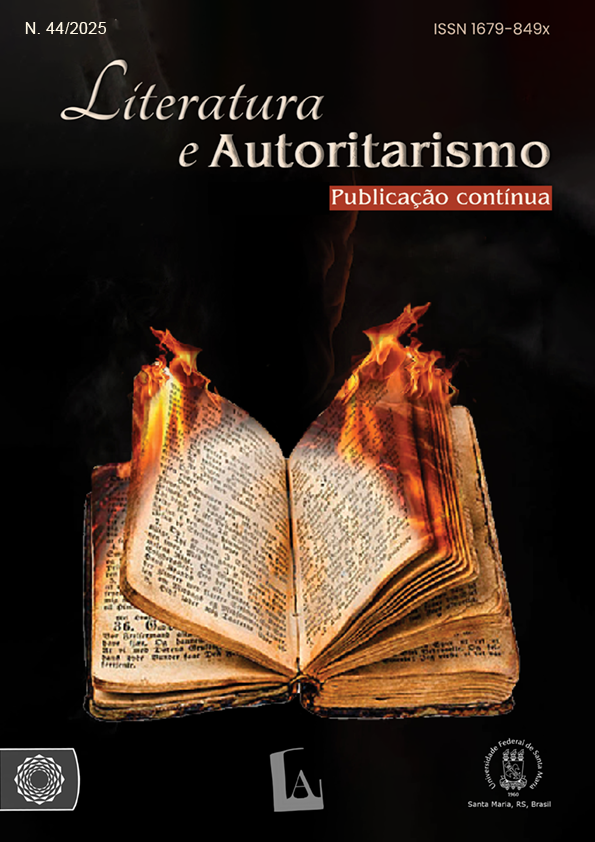Feminine resistance in the short story “A Mãe de um Rio,” by Agustina Bessa-Luís: reflection on memory, ancestry, and myth
DOI:
https://doi.org/10.5902/1679849X88026Keywords:
A Mãe de um rio , Agustina Bessa-Luís, Ancestry and memory, Resistance of existences, Resistance as deviationAbstract
This article analyzes elements related to memory, ancestry, and myth present in the short story A Mãe de Um Rio as mechanisms of resistance to the hegemony of a masculine-centered mythical ancestry established and maintained through the monopoly and control of memory. In light of this premise, the study considers this category through Michael Pollak’s (1989) concept of memória de enquadramento, presented in his article Memória, Esquecimento e Silêncio, which is organized through control mechanisms aimed at producing and maintaining collective memory. From this perspective, the analysis focuses on strategies of resistance inherent to the artistic process—problematized by Alfredo Bosi (1996) and theoretically supported by Walter Benjamin (1987). Concerning the ethical dimension and the writer’s craft, another fundamental reference for this analysis lies in the correlation between the concepts of resistência das existências and resistência como desvio, developed by Augusto Sarmento-Pantoja (2022) and Tânia Sarmento-Pantoja (2022), respectively. The analyses point to the existence of a set of resistance strategies within the short story, which, through the characters’ actions, challenge the hegemonic masculine values intended to subordinate feminine existences.
Downloads
References
BESSA-LUÍS, A. A Brusca. Lisboa: Verbo, 1971.
BESSA-LUÍS, A. A Mãe De Um Rio. In: BESSA-LUÍS, Agustina. A Brusca. Lisboa: Verbo, 1971. p. 103 – 117.
BENJAMIN, W. O autor como produtor. In. Obras escolhidas: Magia e técnica, arte e política. Brasiliense, 1987. p. 120-136.
BOSI, A. Narrativa e Resistência. São Paulo: Itinerários, n. 10, p. 11-27, 1996.
GUIMARÃES, F. C. de O. A Yara, no mito e na literatura: leituras da alma brasileira à luz da psicologia analítica. 2009. Trabalho de Conclusão de Curso (Graduação em Psicologia) – Faculdade de Ciências Humanas e da Saúde, Pontifícia Universidade Católica de São
Paulo, São Paulo, SP, 2009.
HARVEY, P. Dicionário Oxford de literatura clássica: grega e latina. Tradução por Mário da Gama Kury. Rio de Janeiro: Jorge Zahar, 1998.
HALBWACHS, M. Memória individual e memória coletiva. In. HALBWACHS, M. A memória coletiva. São Paulo: Centauro, 2003. p. 29-70.
HESÍODO. Teogonia: a origem dos deuses. São Paulo: Iluminuras, 1991
MENESES, A. B. Sereias: sedução e saber. Revista do Instituto de Estudos Brasileiro, São Paulo, n. 75, p. 71-93, 2020.
POLLAK, M. Memória, esquecimento e silêncio. Estudos históricos, Rio de Janeiro, v. 2, n. 3, p. 3-15, 1989.
RIBEIRO, M. G. A Mitopoética de Paes Loureiro: representações míticas e arquetípicas das serpentes e “Cantares Amazônicos”. In: CONGRESSO INTERNACIONAL DA ABRALIC, 12., 2011, Curitiba. Anais [...]. Curitiba: UFPR, 2011.
SARMENTO-PANTOJA, A. Resistência das existências: leituras de existências femininas apagadas. Revista Moara, [S.l.], n. 61, p. 148-164, 2022.
SARMENTO-PANTOJA, T. Fora da caixa. Resistência como desvio. Revista Moara, [S.l.], n. 61, p. 165-179, 2022.
TORRANO, J. O mundo como função de musas. In: HESÍODO. Teogonia: a origem dos deuses. São Paulo: Iluminuras, 1991. p. 13-97.
Downloads
Published
How to Cite
Issue
Section
License
Copyright (c) 2025 Jose Reinaldo Alves Barros Filho, Augusto Sarmento-Pantoja

This work is licensed under a Creative Commons Attribution-NonCommercial 4.0 International License.
DECLARAÇÃO DE ORIGINALIDADE E EXCLUSIVIDADE E CESSÃO DE DIREITOS AUTORAIS
Declaro que o presente artigo é original e não foi submetido à publicação em qualquer outro periódico nacional ou internacional, quer seja em parte ou na íntegra. Declaro, ainda, que após publicado pela Literatura e Autoritarismo, ele jamais será submetido a outro periódico. Também tenho ciência que a submissão dos originais à Literatura e Autoritarismo implica transferência dos direitos autorais da publicação digital. A não observância desse compromisso submeterá o infrator a sanções e penas previstas na Lei de Proteção de Direitos Autorais (nº 9610, de 19/02/98).






